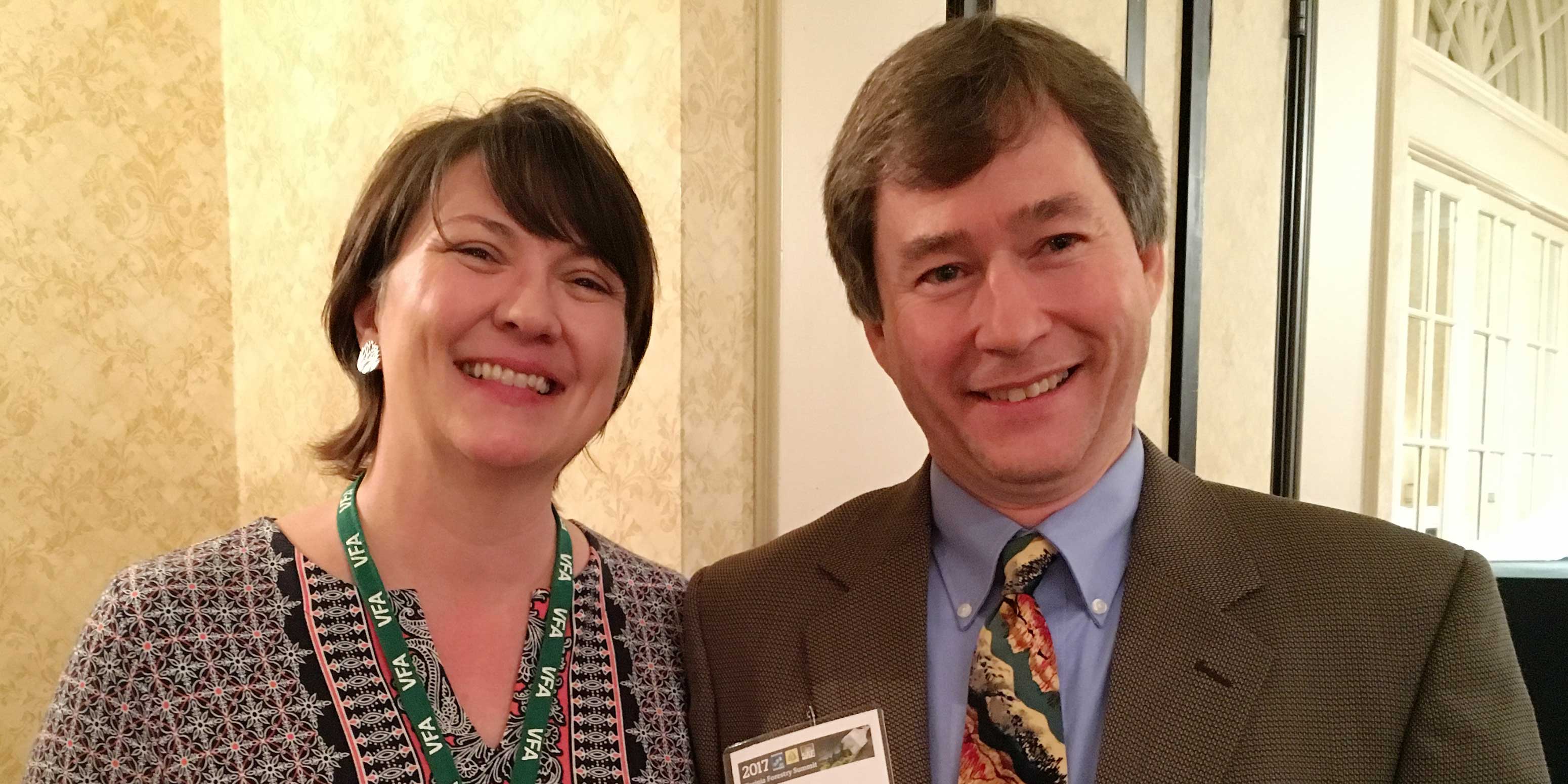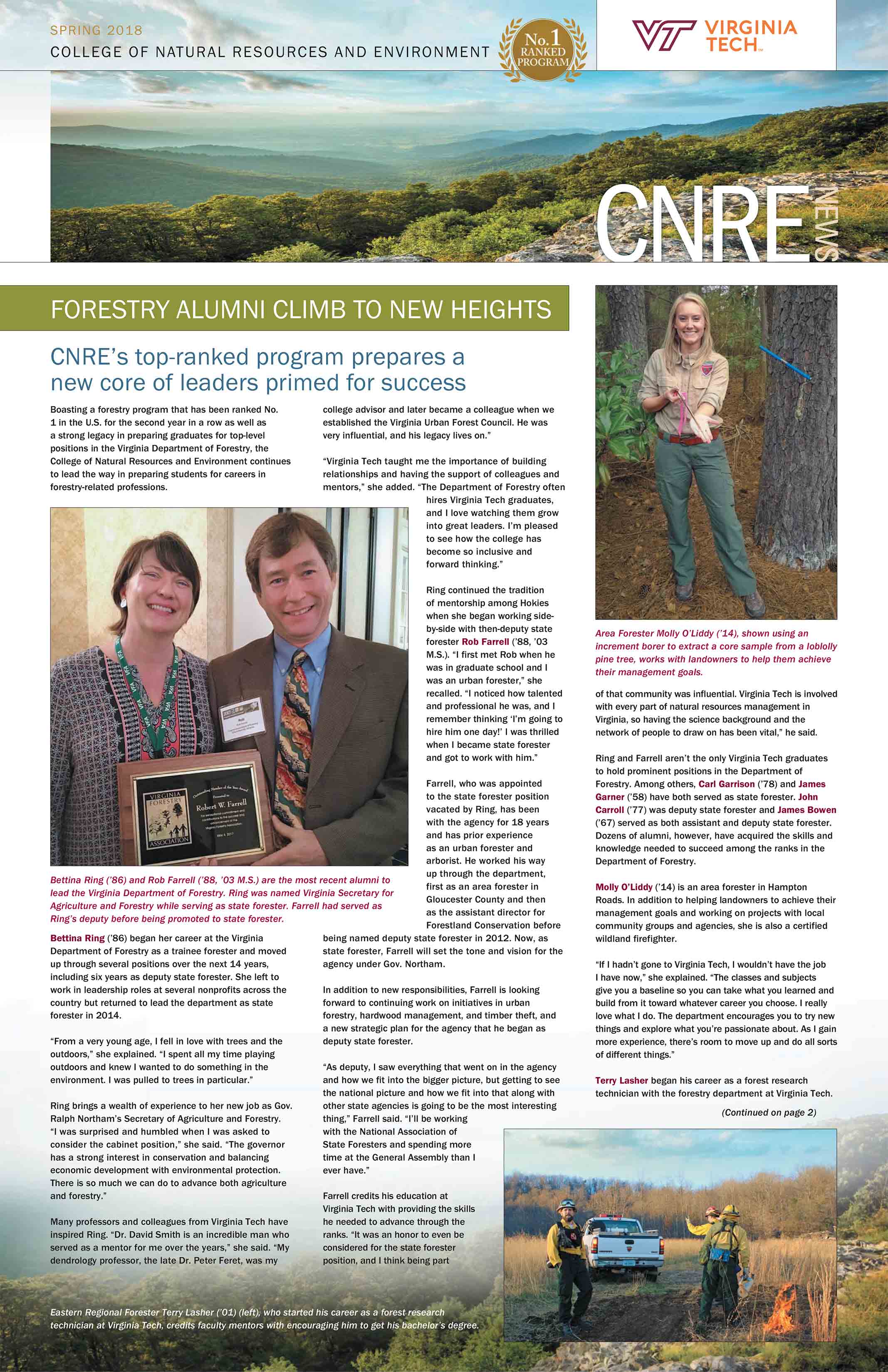CNRE’s top-ranked program prepares a new core of leaders primed for success
CNRE’s top-ranked program prepares a new core of leaders primed for success
May 15, 2018
Bettina Ring (’86) and Rob Farrell (’88, ’03 M.S.) are the most recent alumni to lead the Virginia Department of Forestry. Ring was named Virginia Secretary for Agriculture and Forestry while serving as state forester. Farrell had served as Ring’s deputy before being promoted to state forester.

Boasting a forestry program that has been ranked No. 1 in the U.S. for the second year in a row as well as a strong legacy in preparing graduates for top-level positions in the Virginia Department of Forestry, the College of Natural Resources and Environment continues to lead the way in preparing students for careers in forestry-related professions.
Bettina Ring (’86) began her career at the Virginia Department of Forestry as a trainee forester and moved up through several positions over the next 14 years, including six years as deputy state forester. She left to work in leadership roles at several nonprofits across the country but returned to lead the department as state forester in 2014.
“From a very young age, I fell in love with trees and the outdoors,” she explained. “I spent all my time playing outdoors and knew I wanted to do something in the environment. I was pulled to trees in particular.”
Ring brings a wealth of experience to her new job as Gov. Ralph Northam’s Secretary of Agriculture and Forestry. “I was surprised and humbled when I was asked to consider the cabinet position,” she said. “The governor has a strong interest in conservation and balancing economic development with environmental protection. There is so much we can do to advance both agriculture and forestry.”
Many professors and colleagues from Virginia Tech have inspired Ring. “Dr. David Smith is an incredible man who served as a mentor for me over the years,” she said. “My dendrology professor, the late Dr. Peter Feret, was my college advisor and later became a colleague when we established the Virginia Urban Forest Council. He was very influential, and his legacy lives on.”
“Virginia Tech taught me the importance of building relationships and having the support of colleagues and mentors,” she added. “The Department of Forestry often hires Virginia Tech graduates, and I love watching them grow into great leaders. I’m pleased to see how the college has become so inclusive and forward thinking.”
Ring continued the tradition of mentorship among Hokies when she began working side-by-side with then-deputy state forester Rob Farrell (’88, ’03 M.S.). “I first met Rob when he was in graduate school and I was an urban forester,” she recalled. “I noticed how talented and professional he was, and I remember thinking ‘I’m going to hire him one day!’ I was thrilled when I became state forester and got to work with him.”
Farrell, who was appointed to the state forester position vacated by Ring, has been with the agency for 18 years and has prior experience as an urban forester and arborist. He worked his way up through the department, first as an area forester in Gloucester County and then as the assistant director for Forestland Conservation before being named deputy state forester in 2012. Now, as state forester, Farrell will set the tone and vision for the agency under Gov. Northam.
In addition to new responsibilities, Farrell is looking forward to continuing work on initiatives in urban forestry, hardwood management, and timber theft, and a new strategic plan for the agency that he began as deputy state forester.
“As deputy, I saw everything that went on in the agency and how we fit into the bigger picture, but getting to see the national picture and how we fit into that along with other state agencies is going to be the most interesting thing,” Farrell said. “I’ll be working with the National Association of State Foresters and spending more time at the General Assembly than I ever have.”
Farrell credits his education at Virginia Tech with providing the skills he needed to advance through the ranks. “It was an honor to even be considered for the state forester position, and I think being part of that community was influential. Virginia Tech is involved with every part of natural resources management in Virginia, so having the science background and the network of people to draw on has been vital,” he said.
Ring and Farrell aren’t the only Virginia Tech graduates to hold prominent positions in the Department of Forestry. Among others, Carl Garrison (’78) and James Garner (’58) have both served as state forester. John Carroll (’77) was deputy state forester and James Bowen (’67) served as both assistant and deputy state forester. Dozens of alumni, however, have acquired the skills and knowledge needed to succeed among the ranks in the Department of Forestry.
Molly O’Liddy (’14) is an area forester in Hampton Roads. In addition to helping landowners to achieve their management goals and working on projects with local community groups and agencies, she is also a certified wildland firefighter.
“If I hadn’t gone to Virginia Tech, I wouldn’t have the job I have now,” she explained. “The classes and subjects give you a baseline so you can take what you learned and build from it toward whatever career you choose. I really love what I do. The department encourages you to try new things and explore what you’re passionate about. As I gain more experience, there’s room to move up and do all sorts of different things.”
Terry Lasher began his career as a forest research technician with the forestry department at Virginia Tech. Faculty mentors there, including Mike Aust and Jim Johnson, encouraged him to get his bachelor’s degree in forestry, which he did in 2001. After graduation, he joined the Virginia Department of Forestry, where he has served in several positions around the state. Lasher is now the agency’s eastern regional forester.
“Virginia Tech set me up in a great way with my education and professional contacts,” he said. “My mentors there saw something in me that I didn’t recognize in myself, and they helped me build the confidence I needed to advance. They encouraged me to be a leader and gave me the tools I needed to do so.”
According to Jay Sullivan, professor and head of the college’s Department of Forest Resources and Environmental Conservation, encouragement is at the heart of Virginia Tech’s forestry program. “We seek to prepare all of our students for leadership roles in whatever path they take after leaving Virginia Tech. We pride ourselves in giving them hands-on, practical experience that is consistent with the land-grant mission of the university.”



